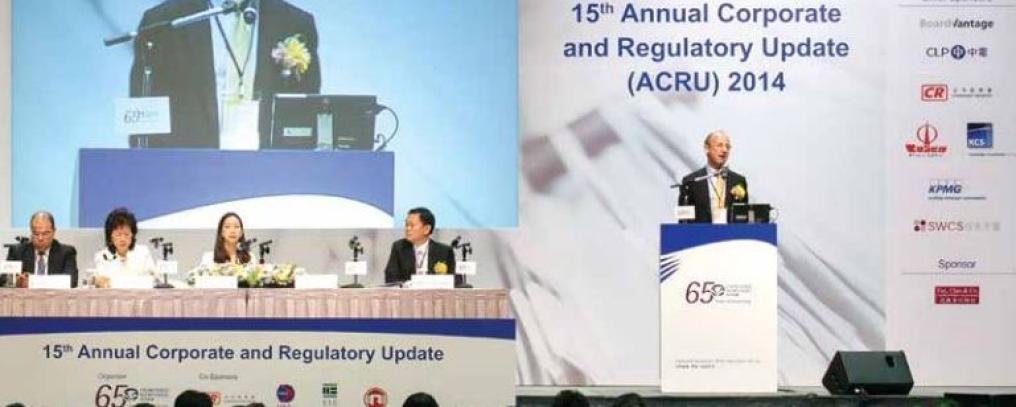Keeping pace with regulatory change is one of the top challenges facing compliance professionals and the Institute's Annual Corporate and Regulatory Update seminar aims to help attendees do just that – providing them with an opportunity to get first-hand information from regulators about the changing regulatory landscape in Hong Kong. CSj highlights the major compliance issues raised at this year's event.
- 36% of issuers complied with all the code provisions, and
- 97% of issuers complied with 70 or more code provisions.
Nevertheless, the review highlighted a number of areas where compliance has been patchy. Ms Ng highlighted three such areas – board diversity, ESG disclosure and internal controls.
Board diversity
Since September 2013, a new code provision in Hong Kong's Corporate Governance Code has required issuers to have and report on a policy on board diversity. Listed companies have to either comply or explain any non-compliance with this new code provision. 'Some companies have neither disclosed a policy nor explained why they have not done so,’ said Ms Ng. 'This is a breach of the code and we have sent letters to them,’ she added.
ESG disclosure
In August 2012, the Exchange introduced its Environmental, Social and Governance Reporting Guide (available on the Exchange's website: www.hkex.com. hk), setting out the basic elements of environmental, social and governance (ESG) disclosure. The guide is a recommended best practice so there is no obligation for listed companies to comply. Ms Ng pointed out, however, that investors increasingly incorporate ESG criteria into their valuations and investment strategies so companies in Hong Kong need to address ESG issues whether or not they are caught by a mandatory requirement. She also outlined the Exchange's plan to review how the market has embraced ESG reporting (it has already sent out a questionnaire), and to raise the obligation level of its ESG guide to a code provision (subject to comply or explain). A question from the floor during the Q&A session asked what the projected date is for companies to comply with the ESG guide if it does become a code provision. Ms Ng responded that the Exchange plans to raise the obligation level of the ESG guide in 2015, but she added that it will not be effective immediately. 'There will be a transition period of at least a couple of months,’ she said, 'so it may be implemented late 2015 or early 2016.’Internal controls
Many compliance failures can be traced back to a failure of internal controls so the Exchange is seeking to upgrade the Corporate Governance Code requirements in this area. Internal controls were specifically omitted from the proposed reforms to the code in 2012, which means that the provisions regarding internal controls have not been updated since 2005. Ms Ng said that the Exchange plans to publish a consultation paper on internal controls this quarter. Once again, Ms Ng emphasised that companies need to ensure they are up to speed in this area irrespective of the regulatory requirements – robust internal controls are simply good risk management practice. 'The majority of investors decline to invest in companies with insufficient risk management,’ she pointed out.Hong Kong's new connected transaction rules
In a jurisdiction like Hong Kong with a large proportion of closely held companies, connected transactions are clearly a major area of concern for regulators. Sammy Chau, Vice-President, Compliance and Monitoring, Listing Department, the Exchange, focused his ACRU presentation on the recently concluded exercise to simplify and improve the clarity of Hong Kong's connected transaction rules (Chapter 14A of the listing rules).• http://www.hkex.com.hk/eng/ rulesreg/listrules/listrulesfaq/ Documents/FAQ_28.pdf, and
• http://www.hkex.com.hk/eng/ rulesreg/listrules/listguid/iporq/ Documents/gl73-14.pdf.
The new Companies Ordinance
Hong Kong's new Companies Ordinance (Cap 622) was implemented on 3 March 2014. Three speakers from the Companies Registry highlighted the key changes brought in by the new law. First up was Karen Ho, Deputy Principal Solicitor (Company Law Reform), Companies Registry, who gave a general introduction to the new law and highlighted some of the compliance challenges it poses.The statutory statement on directors’ duty of care, skill and diligence
There were no provisions on directors’ duty of care, skill and diligence in the old Companies Ordinance (Cap 32). Ms Ho explained that the new Companies Ordinance introduces a statutory statement on these duties to provide clear guidance to directors. She added that both objective and subjective elements will be taken into account when assessing whether directors have exercised reasonable care, skill and diligence. This means that what is required of directors will vary between different types of directors and between different types and sizes of companies. Strengthening the accountability of directors is one of the major aims of the new Companies Ordinance and Ms Ho highlighted another new requirement of the law intended to achieve this aim – the requirement for all companies (private and public) to have at least one director who is a natural person. There has been some concern in the market regarding the practice of appointing corporate bodies rather than natural persons as directors since this can disguise the identity of those controlling companies. There were provisions in the old Companies Ordinance prohibiting all public companies, as well as private companies which are members of a group of companies of which a listed company is a member, from appointing corporate directors, but there was no restriction for other private companies.The 'business review’ requirement
Under the new Companies Ordinance, Hong Kong-incorporated companies, unless they qualify for simplified reporting, will need to include a 'business review’ in their corporate reports for financial years beginning on, or after, 3 March 2014. Schedule 5 of the new law sets out the required contents for the business review and these include a number of ESG areas, such as the company's environmental policies and performance, and the company's key relationships with its employees, customers and suppliers and others. Companies which are eligible for simplified reporting are exempted from the business review requirement and Ms Ho explained the qualifying criteria for simplified reporting as set out in Division 2 of Part 9 and Schedule 3 of the new Companies Ordinance. The new law sets out specific size criteria for companies to be eligible for simplified reporting, but there has been some doubt as to which financial year these criteria apply. Ms Ho explained that, for companies incorporated before the implementation of the new Companies Ordinance, it is the size of the company in the first financial year after commencement of the new Companies Ordinance, or the financial year immediately preceding that first financial year, that counts.The definition of 'responsible person’
The new definition of 'responsible person’ brought in by the new Companies Ordinance has generated a lot of interest among company secretaries in Hong Kong since it potentially increases their personal liability for breaches of the law. Ms Ho confirmed that the new definition lowers the threshold for contravention by company officers. The old Companies Ordinance attributed criminal liability to officers in default if they 'knowingly and willfully authorised or permitted the default’. 'This puts the evidential burden very high as "willfulness" requires a deliberate act,’ Ms Ho said. 'It was almost impossible to prosecute an officer in default under the old Companies Ordinance, but under the new formulation a “responsible person” may be prosecuted if he or she intentionally or recklessly allows a breach.’ She added that the new definition is not designed to catch negligence. 'The effect of the new formulation is to lower the prosecution threshold to extend liability to reckless acts or omissions by officers, but not negligence,’ she said.Filing requirements
Two other speakers from the Companies Registry – Ms Nancy Yau, Acting Deputy Registry Manager, Company Formation and Enforcement Division, and Ms Marianna Yu, Deputy Registry Manager (Registration), Registration Division, highlighted the practical implications of the new Companies Ordinance for users of the Companies Registry's services – in particular, the key changes in filing requirements and the use of the new specified forms. Since June 2014, the old forms are no longer accepted at the Companies Registry and Marianna Yu described as 'most encouraging’ the rate at which users of the Registry have migrated to new forms. The latest figure indicates that 82% of forms submitted to the Registry are new forms. As in previous years, one of the most useful sections of the Companies Registry session dealt with common errors in forms submitted to the Registry. In her ACRU presentation, Ms Yu concentrated on forms with the highest rejection rate to highlight common problems encountered. Another issue which came up in the Q&A at the end of the Companies Registry session, was whether organisations have to display both the English and Chinese forms of their company name. Karen Ho responded to this question by confirming that the subsidiary legislation to the new Companies Ordinance does require companies to display their registered names, but added that the question of whether this means both the English and Chinese forms of the name is in doubt. 'We will seek legal advice and address this question on our website,’ she said.Corporate insolvency law reform
The Exchange, the SFC and the Companies Registry are regular attendees at the Institute's ACRU seminar. The fourth session of the seminar, however, has been taken by a variety of different regulators over the years, such as the Hong Kong Monetary Authority and the Inland Revenue Department. This year, the Official Receiver's Office (ORO) took the opportunity to brief ACRU participants on the ORO's new legislative proposals to improve Hong Kong's corporate insolvency law. Alan Fong, Legal Services Division 2, the Official Receiver's Office, pointed out that the last major reform of corporate insolvency law in Hong Kong was in 1984, so bringing the legislation up to date is a matter of some urgency. Hong Kong's corporate insolvency law provisions used to be a part of the Companies Ordinance. Since March this year, however, they have been excluded from the new Companies Ordinance (Cap 622), and the old Companies Ordinance has been renamed the Companies (Winding Up and Miscellaneous Provisions) Ordinance (Cap 32).- facilitate more efficient administration of the winding-up process
- increase the protection of creditors through streamlining and rationalising the winding- up procedure having regard to international experience, and
- enhance the regulation of the winding-up process.
- commencement of winding-up
- appointment, powers, vacation of office and release of provisional liquidators and liquidators
- conduct of winding-up
- voidable transactions, and
- investigation during winding-up, offences antecedent to or in the course of winding-up, and powers of the court.



